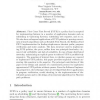231 search results - page 14 / 47 » End-to-end Fairness Analysis of Fair Queuing Networks |
SIGECOM
2005
ACM
14 years 2 months ago
2005
ACM
We study two problems, that of computing social optimum and that of finding fair allocations, in the congestion game model of Milchtaich[8] Although we show that the general prob...
INFOCOM
2008
IEEE
14 years 3 months ago
2008
IEEE
Abstract—We present a framework for designing delayindependent end-to-end congestion control algorithms, where each end-user may have a different utility function. We only requir...
WSC
2008
13 years 11 months ago
2008
Class Based Weighted Fair Queueing (CBWFQ) is a very important router discipline that allows different types of Internet Protocol (IP) traffic like voice, video, and best effort d...
INFOCOM
2005
IEEE
14 years 2 months ago
2005
IEEE
— One of the challenges facing the networking industry today is to increase the profitability of Internet services. This calls for economic mechanisms that can enable providers ...
HIPC
2007
Springer
14 years 15 days ago
2007
Springer
First Come First Served (FCFS) is a policy that is accepted for implementing fairness in a number of application domains such as scheduling in Operating Systems, scheduling web req...

